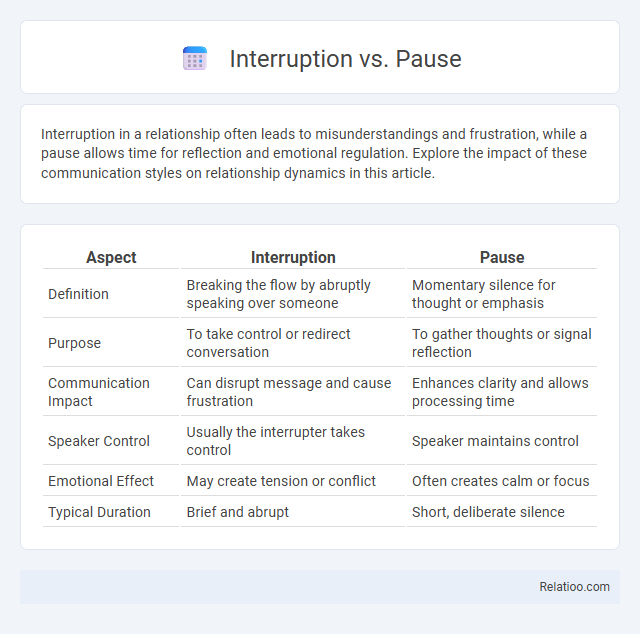Interruption in a relationship often leads to misunderstandings and frustration, while a pause allows time for reflection and emotional regulation. Explore the impact of these communication styles on relationship dynamics in this article.
Table of Comparison
| Aspect | Interruption | Pause |
|---|---|---|
| Definition | Breaking the flow by abruptly speaking over someone | Momentary silence for thought or emphasis |
| Purpose | To take control or redirect conversation | To gather thoughts or signal reflection |
| Communication Impact | Can disrupt message and cause frustration | Enhances clarity and allows processing time |
| Speaker Control | Usually the interrupter takes control | Speaker maintains control |
| Emotional Effect | May create tension or conflict | Often creates calm or focus |
| Typical Duration | Brief and abrupt | Short, deliberate silence |
Understanding Interruption and Pause
Interruption refers to an unexpected break in communication or activity that disrupts the flow, often causing loss of focus or momentum, while a pause is an intentional, controlled break allowing for reflection or emphasis without breaking continuity. Understanding interruption involves recognizing its impact on cognitive processing and communication efficacy, whereas pause supports clarity and comprehension. Effective communication requires distinguishing between these two to manage conversations or tasks smoothly, optimizing engagement and productivity.
Key Differences Between Interruption and Pause
Interruption refers to an unexpected break or disruption in the flow of an activity or conversation, whereas a pause is a deliberate, temporary stop designed to create emphasis or allow for reflection. Interruptions often cause a loss of focus or hinder communication, while pauses enhance clarity and engagement by providing a moment to process information. In communication dynamics, distinguishing between an interruption and a pause is crucial for maintaining effective dialogue and respectful interaction.
Psychological Impact of Interruption vs Pause
Interruption often triggers stress and disrupts cognitive flow, leading to decreased productivity and increased frustration. In contrast, a pause allows for reflection and mental reset, promoting emotional regulation and improved problem-solving abilities. Understanding the psychological impact of interruption versus pause highlights the importance of controlled breaks in enhancing focus and reducing anxiety.
Effects on Productivity and Focus
Interruptions cause a complete breakdown in your workflow, leading to significant drops in productivity and cognitive focus as the brain must refocus on tasks after the disruption. Pauses, when strategically implemented, serve as intentional breaks that can enhance concentration and mental clarity, resulting in improved overall efficiency. Unlike interruptions, which are unplanned and often detrimental, effective pauses allow your mind to recharge and maintain sustained attention on subsequent activities.
Common Scenarios for Interruptions
Interruptions often occur in common scenarios such as phone calls during meetings, unexpected questions while working, or external noises disrupting focus. Pauses, unlike interruptions, serve as intentional breaks for reflection or breathing space within conversations or tasks. Understanding these differences helps you manage workflow efficiency and maintain communication clarity.
Intentional Use of Pausing in Communication
Intentional use of pausing in communication enhances clarity, emphasizes key points, and allows listeners to process information effectively, distinguishing it from interruptions that disrupt speaker flow. Pauses strategically placed can convey confidence, control, and thoughtful engagement, whereas interruptions often signal impatience or dominance. Understanding the semantic impact of these elements improves conversational dynamics and fosters respectful dialogue.
Managing Interruptions in Daily Life
Managing interruptions in daily life requires distinguishing between pauses and interruptions to maintain productivity. Pauses are intentional breaks that allow mental rest and improve focus, while interruptions are unexpected disruptions that can derail tasks and reduce efficiency. Implementing strategies such as setting boundaries, using time-blocking techniques, and minimizing external distractions helps effectively manage interruptions and maintain workflow.
Strategies for Effective Pausing
Effective pausing strategies involve distinguishing between a pause, a brief intentional break in speech, and an interruption, which disrupts the flow and understanding of communication. You can enhance conversational clarity by using pauses to emphasize points, gather thoughts, and give listeners time to process information, while avoiding interruptions that may cause confusion or frustration. Mastering the timing and length of pauses helps maintain engagement and supports smoother interactions in both personal and professional settings.
Choosing Between Interruption and Pause
Choosing between interruption and pause depends on the context and communication goals. An interruption breaks the flow, often signaling urgency or the need to correct, while a pause provides a deliberate silence to enhance understanding or emphasize a point. Effective communication balances using pauses for reflection and interruptions for necessary interjections to maintain clarity and engagement.
Practical Tips for Better Workflow Management
Effective workflow management requires understanding the distinctions between interruptions, pauses, and breaks to optimize productivity. Interruptions are unplanned disruptions that demand immediate attention, whereas pauses are intentional short rests to rejuvenate focus without losing momentum. You can improve your work efficiency by scheduling deliberate pauses and minimizing interruptions through methods like time-blocking and setting clear boundaries.

Infographic: Interruption vs Pause
 relatioo.com
relatioo.com